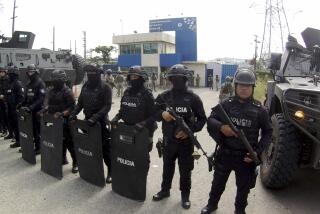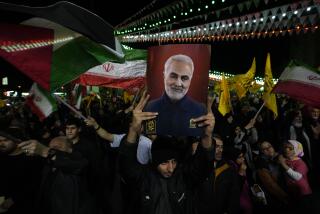American Embassy Personnel, Families Detained in Baghdad : Gulf crisis: U.S. and other embassies in Kuwait are surrounded by Iraqi troops. Gorbachev messages Hussein, calling the situation ‘extemely dangerous.’
- Share via
Saddam Hussein made diplomats his latest target Friday, ringing foreign missions in Kuwait with Iraqi troops and detaining a group of U.S. Embassy staff and dependents who had been promised safe passage from his capital. Britain said tanks surrounded its embassy, and the water and power were cut.
Diplomats made Hussein a target too. The Soviet envoy to the United Nations said Friday that Moscow would back a U.S. resolution in the Security Council authorizing use of “minimum force” to halt all shipping to and from Iraq.
The move cleared the final obstacle to council approval of the U.S. initiative, which would enforce the U.N.-ordered embargo of Iraq.
Earlier in the day, Soviet President Mikhail S. Gorbachev sent an urgent message to Hussein warning that the Persian Gulf situation was “extremely dangerous.”
The conflict came home to hundreds of U.S. military reservists called up in the first such summons since Vietnam.
Iraq’s Parliament speaker, Sadi Mehdi Saleh, said Friday that the presence of U.S. forces in the gulf might ignite a war that would set the region and its oil reserves afire and kill thousands of Americans.
At least nine embassies in Kuwait--including the U.S. and British missions--were guarded by troops Friday as diplomats defied an Iraqi order to close their doors. With its Aug. 2 conquest of Kuwait and its quick annexation of the small oil state, Iraq now considers Kuwait to be Iraqi territory.
A European envoy said Baghdad threatened to use force to remove diplomats remaining at their posts over the weekend. The Iraqis also threatened to cut water and power to the missions, and the Foreign Office in London said they did just that on Friday at the British Embassy.
Like other embassies staying open, the U.S. mission had a skeleton staff of about 10. More than 100 U.S. Embassy staff and dependents, including about 30 children, left Kuwait only to find new trouble in Baghdad, where they were detained.
White House spokesman Marlin Fitzwater said Friday the Iraqis had promised earlier to allow the group of Americans to leave, but then reneged. “They are safe,” he said, but stuck.
The official Iraqi News Agency said later that Iraq would detain only the male embassy employees--including diplomats--of those countries that refused to close their embassies in occupied Kuwait. But there was no indication that the dependents were being allowed to leave.
The Foreign Ministry in Rome said that three Italian diplomats who left Kuwait Thursday were kept from leaving Baghdad on Friday, and that the reason cited was the Italian Embassy’s refusal to close.
Besides the diplomats, about 21,000 Westerners--including 3,000 Americans--were caught in Iraq and Iraqi-occupied Kuwait by the invasion, and President Bush said they must be considered hostages.
Getting out of Iraq was becoming harder even for people from countries not considered hostile toward Baghdad.
Jordan, however, still let refugees cross over from Iraq despite Wednesday’s announcement that the border would be closed to them. Jordan said coping with thousands of refugees had become too much of a burden. The European Community and others moved to help with money and supplies.
Turkey, another escape route for refugees, said it might close its border with Iraq unless countries whose nationals are coming through take steps to ensure quick transport elsewhere.
Gorbachev’s message to Hussein appeared to be a warning that the Soviet Union would go along with the Western powers unless Iraq quickly took steps to withdraw from Kuwait and free foreign hostages.
Gorbachev urged Iraq to comply immediately with U.N. Security Council resolutions and warned that failure to do so would “inevitably prompt the Security Council to take corresponding additional measures,” the Soviet news agency Tass said.
The Soviet ambassador to the U.N., Valentin V. Lozinskiy, later announced in New York that Moscow was ending its resistance to backing the U.N.-ordered embargo with military muscle. He also indicated that the Soviets would be willing to join an international force to police the embargo.
In Moscow, Foreign Ministry spokesman Yuri Gremitskikh said that the Soviets had pulled all staff from their Kuwait embassy--but insisted they had not formally closed it. The Soviets--long an ally of Iraq--cut off weapons supplies to Baghdad immediately after the invasion but say they still have scores of military advisers in Iraq.
At the U.S. Embassy in Kuwait, Ambassador Nathaniel Howell and a dozen other Americans remained. The White House said the Iraqi troops outside the embassy in Kuwait “are not allowing people to enter or leave.”
Troops were reported surrounding or patrolling near the American, British, Canadian, French, Japanese, Norwegian, Swedish, Romanian and Hungarian embassies. Nations including Venezuela, the Philippines, India and Lebanon complied with the embassy-closing order.
Spain’s ambassador to Jordan, Ramon Armengod, said in Madrid that Iraqi authorities warned the Western diplomats that troops would forcibly remove them from their missions starting Saturday.
In Bonn, West Germany, the Foreign Ministry said Iraq warned Western embassies in Kuwait Friday night that their water and electricity would be cut off if the missions were not closed. No time frame was apparently given.
Also, the Japanese Foreign Ministry said Iraqi soldiers told the two Japanese diplomats remaining in Kuwait Friday that their diplomatic immunity had been revoked but made no attempt to remove them from the embassy.
The 12 European Community members indicated that they would seek an “explicit, firm condemnation” by the Security Council of Iraq’s behavior if their embassies were interfered with.
In the Arabian desert, Iraqi troops are confronting tens of thousands of U.S. troops deployed to deter further aggression by Hussein.
The American forces were being bolstered by reservists from half a dozen states, who were packing their bags and preparing to report for duty.
Teresa Mason, 21, of Columbus, Ga., shipping out for Saudi Arabia, said goodby to her husband and 3-month-old baby.
“I wasn’t real thrilled with the idea of her going over there, but when you have to go, you go,” said her 23-year-old husband, Joseph.
The mobilization is expected to continue at least until Oct. 1. Bush has the authority to call up as many as 200,000 reserves for up to 180 days without declaring a national emergency.
On the financial front, stock prices rebounded in Tokyo, Europe and New York Friday even as tensions intensified. Oil prices declined after matching record highs during Thursday trading. The price of crude fell $1.02 per barrel to $30.91 on the New York Mercantile Exchange.
Oil ministers from most of the 13 nations making up the Organization of Petroleum Exporting Countries agreed to attend the talks in Vienna today, Venezuelan President Carlos Andres Perez said in Caracas.
More to Read
Sign up for Essential California
The most important California stories and recommendations in your inbox every morning.
You may occasionally receive promotional content from the Los Angeles Times.













